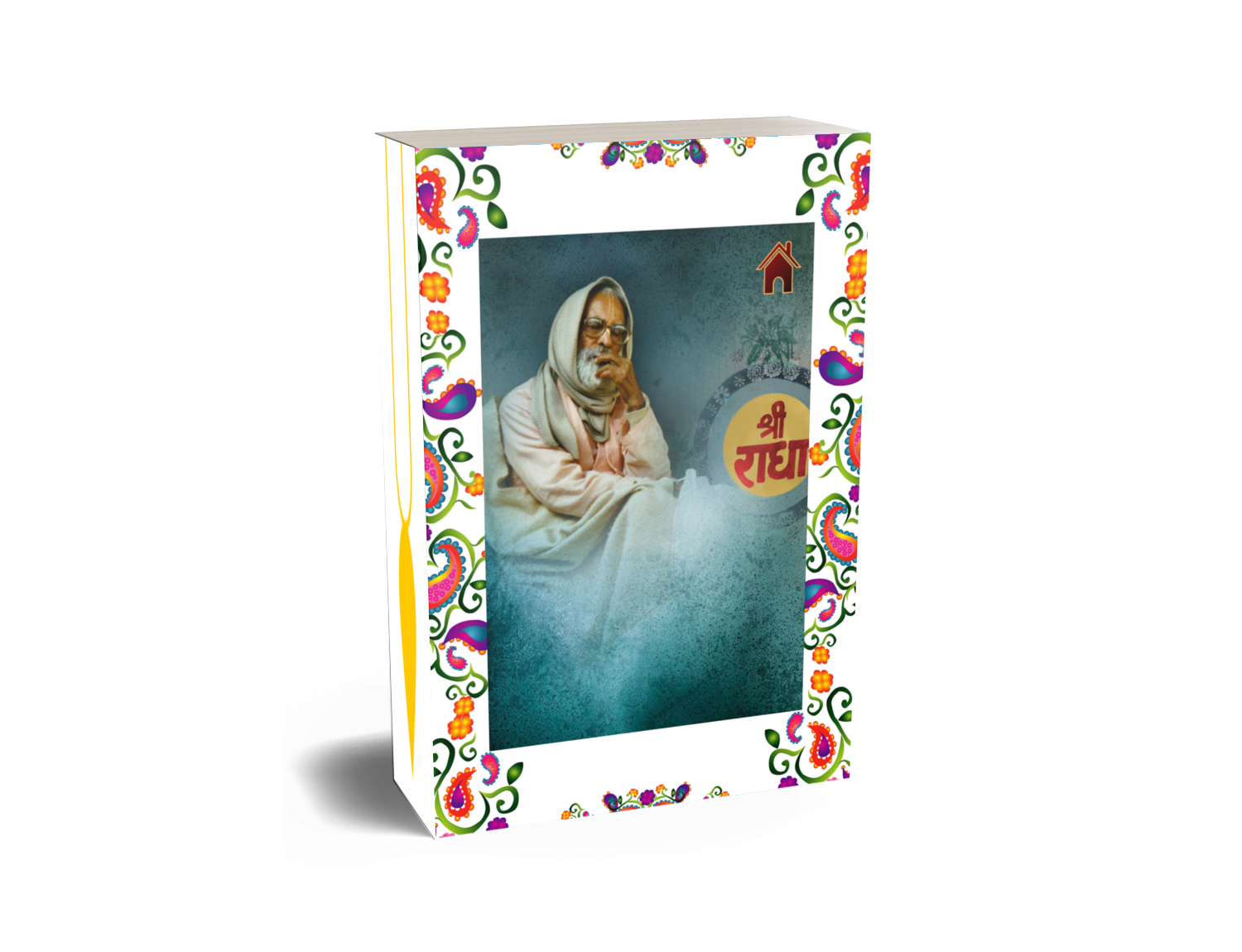

The following is an excerpt from a class given by Śrīla Bhaktivedānta Nārāyaṇa Mahārāja in Hilo, Hawaii, on January 13, 2003
[Śrīla Bhaktivedānta Nārāyaṇa Mahārāja spent the week of January 11-17 in Hilo, Hawaii, enlightening his  audience of two hundred fifty on the topics of guru-tattva and the gradual development of devotion for Śrī Kṛṣṇa. Meanwhile, as sometimes occurs, certain individuals, in an attempt to disinterest others from attending Śrīla Bhaktivedānta Nārāyaṇa Mahārāja’s classes, were engaged in passing out copies of a paper. This time the paper was written on the subject of the relative necessity of harināma initiation (first initiation) and dīkṣā (second initiation). The paper tried its level best to prove that Śrīla Prabhupāda Bhaktivedānta Svāmī Mahārāja and Śrīla Bhakti Rakṣaka Śrīdhara Mahārāja have a different view on the subject than Śrīla Bhaktivedānta Nārāyaṇa Mahārāja. If this were true, it would place Śrīla Bhaktivedānta Nārāyaṇa Mahārāja outside the disciplic line of his predecessor ācāryas. When Śrīla Bhaktivedānta Nārāyaṇa Mahārāja became aware of this attempt to show a difference between them, he gave the following class and clearly showed that the three above-mentioned ācāryas are exactly in the same line. They are all saying, in fact, that the acceptance of the dīkṣā mantras is essential.]
audience of two hundred fifty on the topics of guru-tattva and the gradual development of devotion for Śrī Kṛṣṇa. Meanwhile, as sometimes occurs, certain individuals, in an attempt to disinterest others from attending Śrīla Bhaktivedānta Nārāyaṇa Mahārāja’s classes, were engaged in passing out copies of a paper. This time the paper was written on the subject of the relative necessity of harināma initiation (first initiation) and dīkṣā (second initiation). The paper tried its level best to prove that Śrīla Prabhupāda Bhaktivedānta Svāmī Mahārāja and Śrīla Bhakti Rakṣaka Śrīdhara Mahārāja have a different view on the subject than Śrīla Bhaktivedānta Nārāyaṇa Mahārāja. If this were true, it would place Śrīla Bhaktivedānta Nārāyaṇa Mahārāja outside the disciplic line of his predecessor ācāryas. When Śrīla Bhaktivedānta Nārāyaṇa Mahārāja became aware of this attempt to show a difference between them, he gave the following class and clearly showed that the three above-mentioned ācāryas are exactly in the same line. They are all saying, in fact, that the acceptance of the dīkṣā mantras is essential.]
Śrīla Bhaktivedānta Nārāyaṇa Mahārāja: In my classes I have been explaining the meaning of bhakti and I have explained how we can gradually achieve it, beginning from the smallest fraction of bhakti called śraddhā. We discussed many points, among which was the necessity for guru-pādāśraya and dīkṣā. In the meantime, a topic has arisen that I want to clarify. You should very carefully and seriously hear this very important subject matter. First Śrīpād Padmanābha Mahārāja will present the argument and then I will reply it.
Śrīpād Padmanābha Mahārāja: There is a question concerning the relationship between gāyatrī-mantra (dīkṣā) 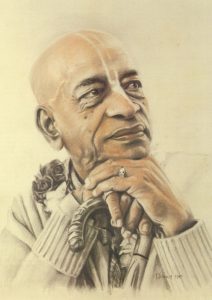 and harināma initiation. Some persons have presented quotes from Śrīla Bhaktivedānta Svāmī Prabhupāda and Śrīla Bhakti Rakṣaka Śrīdhara Mahārāja in order to present the idea, based upon their own understanding, that harināma is complete and sufficient in itself for the conditioned soul, and that initiation into the gāyatrī mantra is not actually required for him. I will read their quotations, and then Śrīla Mahārāja will explain the conclusive philosophical understandings. First of all, they quote Śrīla Prabhupāda in a room conversation in 1973 in Paris, where he says, “Chanting the Hare-Kṛṣṇa mahā-mantra. Then, as he practices, he becomes more purified. Then second initiation – gāyatrī mantra. The first initiation, according to Jīva Gosvāmī, that is sufficient. Chanting the Hare Kṛṣṇa mantra, that is sufficient. But still, to purify them more, the second initiation, gāyatrī, is given.” That is one quote.
and harināma initiation. Some persons have presented quotes from Śrīla Bhaktivedānta Svāmī Prabhupāda and Śrīla Bhakti Rakṣaka Śrīdhara Mahārāja in order to present the idea, based upon their own understanding, that harināma is complete and sufficient in itself for the conditioned soul, and that initiation into the gāyatrī mantra is not actually required for him. I will read their quotations, and then Śrīla Mahārāja will explain the conclusive philosophical understandings. First of all, they quote Śrīla Prabhupāda in a room conversation in 1973 in Paris, where he says, “Chanting the Hare-Kṛṣṇa mahā-mantra. Then, as he practices, he becomes more purified. Then second initiation – gāyatrī mantra. The first initiation, according to Jīva Gosvāmī, that is sufficient. Chanting the Hare Kṛṣṇa mantra, that is sufficient. But still, to purify them more, the second initiation, gāyatrī, is given.” That is one quote.
Then they quote Śrīla Bhakti Rakṣaka Śrīdhara Mahārāja in his book Śrī Guru and his Grace. There he says, “We accept the mantra only to help the nāma bhajana, the worship of the holy name. Otherwise it may not be necessary at all. It has been judged in such a way. The name alone can do everything for a person; it is full and complete. The gāyatrī mantra helps us to do away with the aparādhas (offences) and the ābhāsa or hazy conception. The gāyatrī mantra comes to help us only so far.”
With these two quotations these persons have attempted to support their statement that it is not actually completely essential or necessary for us conditioned souls to accept the gāyatrī mantra – dīkṣā – because harināma is sufficient. They have also suggested that Śrīla Nārāyaṇa Mahārāja is saying something contrary to Śrīla Prabhupāda and Śrīla Śrīdhara Mahārāja. I am also reading the two statements they have quoted from Śrīla Nārāyaṇa Mahārāja. The first is from his book, Going Beyond Vaikuṇṭha: “Without the gopāla-mantra and the kāma-gāyatrī, will our sādhana be complete with only the nāma-saṅkīrtana? No, because by nāma-saṅkīrtana alone we will not be able to chant śuddha-nāma, the pure name of Kṛṣṇa.” The second quotation they cited is from a lecture given by Śrīla Nārāyaṇa Mahārāja on the topic of Śrī Bhajana Rahasya: “Everything is there, but don’t think that we can realize all this by chanting kṛṣṇa-nāma alone. We must chant harināma and gāyatrī-mantra as well. If we want full understanding and realization of what is in the Hare Kṛṣṇa mantra, we must also chant the gāyatrī mantras.
I want to request Śrīla Nārāyaṇa Mahārāja to kindly give the proper philosophical conclusions so that everyone can understand clearly the position of gāyatrī-mantra initiation and harināma initiation, and their relationship.
Śrīla Bhaktivedānta Nārāyaṇa Mahārāja: I think you have all understood the argument; now you should try very carefully to understand the reply so that you can reconcile all the statements. Someone has presented the idea that the acceptance of dīkṣā is not essential, and he has indirectly indicated the verse:
dīkṣā-puraścaryā-vidhi apekṣā nā kare
jihvā-sparśe ā-caṇḍāla sabāre uddhāre
[“One does not have to undergo initiation or execute the activities required before initiation. One simply has to vibrate the holy name with his lips. Thus, even a man in the lowest class [cāṇḍāla] can be delivered.”]
The holy name is sufficient. The holy name is very powerful and can fulfil all desires. The name will even give vraja-prema. What, then, is the need of taking initiation? The paper has quoted my statement, along with the statement of Prapujya-caraṇa Bhakti Rakṣaka Śrīdhara Mahārāja and Śrīla Bhaktivedānta Svāmī Mahārāja; so I want to reconcile all statements.
It is true that dīkṣā-puraścaryā (initiation and the purificatory activities performed before initiation) is not needed in all circumstances; but we should know something about the actual meaning of this verse. Śrīla Bhaktisiddhānta Sarasvati Ṭhākura Prabhupāda has written a book of rules and regulations in deity worship called Arcanā Dīpikā, and there he has explained that harināma is bhagavata-svarūpa, the actual form of Kṛṣṇa and Rāḍha, and for this reason it is stated in Śrī Śikṣāṣṭakam, “Paraṁ vijayate śrī kṛṣṇa-saṅkīrtana.” By chanting and remembering Kṛṣṇa’s names, all kinds of perfection — like vraja-prema and even rāḍha-dāsya (becoming a maidservant of Śrīmati Rādhikā) — can be attained. In the first stage, however, when a devotee is uttering the holy name he is full with many aparādhas, and also anarthas such as laya (sleep), vikṣepa (distraction), aprātipatti (indifference or disinterest in spiritual topics), and so on. It is guaranteed that such a person cannot utter the pure name. Rather, his chanting will be nāma-aparādha. Chanting the pure name is only possible after the dīkṣā-saṁskāra.
and Rāḍha, and for this reason it is stated in Śrī Śikṣāṣṭakam, “Paraṁ vijayate śrī kṛṣṇa-saṅkīrtana.” By chanting and remembering Kṛṣṇa’s names, all kinds of perfection — like vraja-prema and even rāḍha-dāsya (becoming a maidservant of Śrīmati Rādhikā) — can be attained. In the first stage, however, when a devotee is uttering the holy name he is full with many aparādhas, and also anarthas such as laya (sleep), vikṣepa (distraction), aprātipatti (indifference or disinterest in spiritual topics), and so on. It is guaranteed that such a person cannot utter the pure name. Rather, his chanting will be nāma-aparādha. Chanting the pure name is only possible after the dīkṣā-saṁskāra.
Śrīla Jīva Gosvāmī explains dīkṣā in his Bhakti-sandarbha (283):
divyaṁ jñānaṁ yato dadyāt
kuryāt pāpasya saṅkṣayam
tasmād dīkṣeti sā proktā
deśikais tattva-kovidaiḥ
[“Dīkṣā is the process by which one can awaken his transcendental knowledge and vanquish all reactions caused by sinful activity. A person expert in the study of the revealed scriptures knows this process as dīkṣā.” (quoted in Śrī Caitanya-caritāmṛta: Madhya 15.108 purport)]
The gāyatrī-mantra gives all kinds of divyā-jñāna, transcendental knowledge, including the knowledge of kṛṣṇa-tattva and jīva-tattva, and it also gives a relationship with Kṛṣṇa. Nāma alone will not give this relation to the person filled with anarthas. All of our ācāryas, from top to bottom, have stated that in order to purify us from our sinful actions and to clear offences (anartha–nivṛtti) so that we can develop the ability to chant the pure name, we must accept dīkṣā-vidhāna (the process of initiation). Dī — kṣā. Dī means divyā-jñāna, or realized knowledge of our relationship with Kṛṣṇa. Kṣā is the washing away of all sins, aparādhas, and other impurities. For this, dīkṣā-vidhāna is essential. Without dīkṣā-saṁskāra, one’s relationship with Kṛṣṇa (sambandha-jñāna) cannot manifest and one cannot chant śuddha-nāma. It is essential to accept dīkṣā.
yathā kāñcanatāṁ yāti
kāsyaṁ rasa-vidhānataḥ
tathā dīkṣā-vidhānena
dvijatvaṁ jāyate nṛṇām
[“As bell metal (a mixture of copper and tin) becomes gold by mixing with mercury, similarly, by the process of  dīkṣā, initiation, a person becomes a brāhmaṇa.”( Śrī Hari-bhakti-vilāsa)]
dīkṣā, initiation, a person becomes a brāhmaṇa.”( Śrī Hari-bhakti-vilāsa)]
Bell metal turns into gold with the help of the element mercury in an alchemical process. Similarly, by this element, the process of dīkṣā, our chanting of the holy name will become pure; otherwise it is not possible.
If there is no necessity to accept dīkṣā-mantra, why did Śrīla Bhaktisiddhānta Sarasvatī Ṭhākura Prabhupāda take second initiation from Śrīla Gaurakiśora dāsa Bābājī Mahārāja, and why did he give dīkṣā initiation to all of his disciples? Parama-pujyapāda Śrīla Śrīdhara Gosvāmī Mahārāja also took dīkṣā from him. If there is no necessity, why did Śrīla Prabhupāda Bhaktisiddhānta Sarasvatī Ṭhākura give dīkṣā initiation, and why did his disciples accept it?
Not only that, Brahmā received kāma-gāyatrī and gopāla-mantra from Kṛṣṇa Himself. Brahmā then gave the dīkṣā-mantra to Śrī Nārada Ṛṣi, and Nārada gave it to so many disciples. Nārada not only gave harināma to Dhruva Mahārāja; he gave him dīkṣā by the mantra: oṁ namo bhagavate vāsudevāya. Śrī Caitanya Mahāprabhu took initiation from Śrī Īśvara Puripāda, who first gave Him harināma, and to purify that chanting of nāma, he gave Him gopāla-mantra. Gopāla-mantra is transcendental and ever-existing, and it gives a relationship with Kṛṣṇa as Gopījana-vallabha. We should consider all this evidence.
All the ācāryas in our guru-paramparā have accepted second initiation from a bona fide guru. Can those who say that harināma is sufficient for conditioned souls name any ācārya in our guru-paramparā who has not taken dīkṣā initiation? Śrīla Gaurakiśora dāsa Bābājī Mahārāja, Śrīla Bhaktivinoda Ṭhākura, Śrīla Visvanatha Cakravartī Ṭhākura, and the Six Gosvāmīs took second initiation, and Śrīla Bhaktivedānta Svāmī Prabhupāda took it. Why did they take dīkṣā initiation if it is not essential? You should know the gravity of this truth. Śrī Caitanya Mahāprabhu, Śrī Nityānanda Prabhu, Śrī Advaita Ācārya, Śrī Gadādhara Paṇḍita, Śrī Īśvara Purī, and Śrī 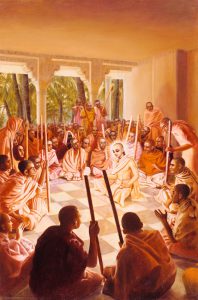 Mādhavendra Purī have all taken dīkṣā. Why, then, should we not take it? Why is it not essential? If it is not essential, then why did Śrī Sanātana Gosvāmī write about it in his Śrī Hari-bhakti-vilāsa? Why did Śrī Gopāla Bhaṭṭa Gosvāmī also write about it? Did he say it was useless? Those who say that dīkṣā is not essential will not be able to answer these questions in hundreds and millions of years.
Mādhavendra Purī have all taken dīkṣā. Why, then, should we not take it? Why is it not essential? If it is not essential, then why did Śrī Sanātana Gosvāmī write about it in his Śrī Hari-bhakti-vilāsa? Why did Śrī Gopāla Bhaṭṭa Gosvāmī also write about it? Did he say it was useless? Those who say that dīkṣā is not essential will not be able to answer these questions in hundreds and millions of years.
Śrī Caitanya Mahāprabhu took initiation even though he is the Lord of lords — Rādhā and Kṛṣṇa combined — and yet He went to Gayā and took initiation. He vividly explained this fact in a gathering of sannyāsīs in Kāśī when those sannyāsīs asked Him, “O, You are a very young and qualified sannyāsī. Why do you not hear Vedānta? Why do you engage in singing and dancing and rolling on the ground? A sannyāsī should not dance and do all these things.” Śrī Caitanya Mahāprabhu replied by telling them of the order of His guru, Śrī Īśvara Purīpāda:
Mahāprabhu said, “Guru mora mūrkha dekhi — My Guru Mahārāja told me that because I am foolish and unintelligent, I am not qualified to study Vedānta. He said that instead I should always chant Hare Kṛṣṇa and I should remember this verse:
harer nāma harer nāma
harer nāmaiva kevalam
kalau nāsty eva nāsty eva
nāsty eva gatir anyathā
(Caitanya Caritāmṛta Adi-līlā 17.21)
[“In this Age of Kali there is no other means, no other means, no other means for self-realization than chanting the holy name, chanting the holy name, chanting the holy name of Lord Hari.”]
But Śrī Caitanya Mahāprabhu not only took harināma from His gurudeva; He also took second initiation through the gopāla-mantra. In our paramparā, in order to purify one’s chanting and to and give the chanter a relationship with Kṛṣṇa who has kindly taken the form of His holy name, the gopāla-mantra is given along with harināma. Up until Caitanya Mahāprabhu’s manifested pastimes only the gopāla-mantra was given. Later, Śrīla Dhyānacandra Gosvāmī and Śrīla Gopāla-guru Gosvāmī gave the regulations we now follow. They gave brahma-gāyatrī, guru-mantra, guru-gāyatrī, gaura-mantra, gaura-gāyatrī, kṛṣṇa-mantra (gopāla-mantra) and finally kāma-gāyatrī. This is the process followed in our sampradāya as begun by Śrīla Gopāla-guru Gosvāmī, who is a disciple of Vakreśvara Paṇḍita who is an associate of Śrī Caitanya Mahāprabhu.
Caitanya Mahāprabhu quoted His gurudeva saying, “Kṛṣṇa-mantra japa sadā — ei mantra-sāra. You must always chant the holy name of Kṛṣṇa. This is the essence of all mantras, or Vedic hymns.”
kṛṣṇa-mantra haite habe saṁsāra-mocana
kṛṣṇa-nāma haite pābe kṛṣṇera caraṇa
[“Simply by chanting the holy name of Kṛṣṇa one can obtain freedom from material existence. Indeed, simply by chanting the Hare Kṛṣṇa mantra one will be able to see the lotus feet of the Lord.”]
The offenseless chanting of the holy name does not depend on the initiation process. But that name must be the pure name, and how will it become so? It can only become pure through that dīkṣā process; otherwise it is not possible. It is not that the holy name is not pure, but if a person is not a pure devotee he cannot chant the pure name. He can only chant syllables that sound like the name. He can only chant offences to the name ( nāma-aparādha) or a shadow of the name (nāma-ābhāsa). Śrī Caitanya Mahāprabhu chanted the pure name, and therefore He was able to tell His gurudeva:
kibā mantra dilā, gosāñi, kibā tāra bala
japite japite mantra karila pāgala
[“‘My dear lord, what kind of mantra have you given Me? I have become mad simply by chanting this mahā-mantra!'”(Caitanya-caritāmṛta Adi 7.81)]
Caitanya Mahāprabhu told the sannyāsīs, “You ask why I dance and sing and roll on the ground. Here is the reason: When My gurudeva initiated me, he gave me both the harināma mantra and the gopāla-mantra.” Then He said, “japite japite mantra.” If He had only received harināma, the mahā-mantra, He would not have said the word “mantra”? Mantra especially refers to gopāla-mantra and kāma-gāyatrī. He first received harināma and then gopāla-mantra. “Japite japite mantra karila pāgala — and this made Me mad. Kṛṣṇa nāma mantra — meaning gopāla and mahā mantra made Him “like a madman”.
For those who always remember and meditate on the gopāla-mantra and kāma-gāyatrī, by the power of the mantra, rati (bhava-bhakti) will at once enter their hearts. It has been written in Caitanya-caritāmṛta: Antya-līlā 4.192:
dīkṣā-kāle bhakta kare ātma-samarpaṇa
sei-kāle kṛṣṇa tāre kare ātma-sama
[“At the time of initiation, when a devotee fully surrenders unto the service of the Lord, Kṛṣṇa accepts him to be as good as Himself.”]
The first initiation is called harināma initiation only, and the second initiation is called dīkṣā. Ātma samarpaṇa — at the time of dīkṣā the disciple totally surrenders unto the feet of his gurudeva. Sei-kāle. At that time Kṛṣṇa gives the shelter of His lotus feet, and He makes that disciple ātma-sama, very near and dear to Him.
According to the Vaiṣṇava regulative principles, one must be initiated as a brāhmaṇa. As quoted in the Hari-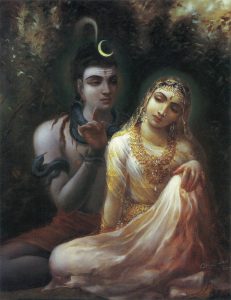 bhakti-vilāsa (2.6) from the Viṣṇu-yāmala, Lord Śaṅkara says to his wife Pārvatī:
bhakti-vilāsa (2.6) from the Viṣṇu-yāmala, Lord Śaṅkara says to his wife Pārvatī:
adīkṣitasya vāmoru
kṛtaṁ sarvaṁ nirarthakam
paśu-yonim avāpnoti
dīkṣā-virahito janaḥ
“O Vāmaru — O beautiful Pārvatī. Regarding those who have not taken dīkṣā, all their devotional activities, such as sādhana, bhajana, and pūjā, have all gone in vain. They are all useless. Such persons who are not properly initiated must again enter the many animal species.”
In addition, it has been told that nāma can give everything, including Kṛṣṇa-prema, simply by touching the tongue. It is stated in Padyāvalī, a book compiled by Śrīla Rūpa Gosvāmī:
ākṛṣṭiḥ kṛta-cetasāṁ su-manasām uccāṭanaṁ cāṁhasām
ācaṇḍālam amūka-loka-sulabho vaśyaś ca mukti-śriyaḥ
no dīkṣāṁ na ca sat-kriyāṁ na ca puraścaryāṁ manāg īkṣate
mantro ’yaṁ rasanā-spṛg eva phalati śrī-kṛṣṇa-nāmātmakaḥ
[“‘The holy name of Lord Kṛṣṇa is an attractive feature for many saintly, liberal people. It is the annihilator of all sinful reactions and is so powerful that, save for the dumb who cannot chant it, it is readily available to everyone, including the lowest type of man, the cāṇḍāla. The holy name of Kṛṣṇa is the controller of the opulence of liberation, and it is identical with Kṛṣṇa. When a person simply chants the holy name with his tongue, immediate effects are produced. Chanting the holy name does not depend on initiation, pious activities or the puraścaryā regulative principles generally observed before initiation. The holy name does not wait for any of these activities. It is self-sufficient.'”(quoted in Śrī Caitanya-caritāmṛta Madhya 15.110]
Can this occur if one’s chanting is not pure? This is the question that has been raised here. Can this occur without dīkṣā? In the Hari-bhakti-vilāsa (17.4-5, 7) it is stated:
vinā yena na siddhaḥ syān
mantro varṣa-śatair api
kṛtena yena labhate
sādhako vāñchitaṁ phalam
puraścaraṇa-sampanno
mantro hi phala-dhāyakaḥ
ataḥ puraṣkriyāṁ kuryāt
mantravit siddhi-kaṅksayā
puraṣkriyā hi mantrāṇāṁ
pradhānaṁ vīryam ucyate
vīrya-hīno yathā dehī
sarva-karmasu na kṣamaḥ
puraścaraṇa-hīno hi
tathā mantraḥ prakīrtitaḥ
[“Without performing the puraścaryā activities, one cannot become perfect even by chanting this mantra for hundreds of years. But one who has undergone the puraścaryā-vidhi process can attain success very easily. If one wishes to perfect his initiation, he must first undergo the puraścaryā activities. The puraścaryā process is the life force by which one is successful in chanting the mantra. Without the life force, one cannot do anything; similarly, without the life force of puraścaryā-vidhi, no mantra can be perfected.” (quoted in Śrīla Prabhupāda’s purport to Śrī Caitanya-caritāmṛta Madhya 15.108)]
Śrīla Jīva Gosvāmī has quoted a verse, in order to further dissolve any misunderstanding in this regard. In his Bhakti-sandarbha (283-84), Śrīla Jīva Gosvāmī describes the importance of Deity worship and initiation (dīkṣā) as follows:
yadyapi śrī-bhāgavata-mate pañcarātrādi-vat arcana-mārgasya āvaśyakatvaṁ nāsti, tad vināpi śaraṇāpattyādīnām ekatareṇāpi puruṣārtha-siddher abhihitatvāt, tathāpi śrī-nāradādi-vartmānusaradbhiḥ śrī-bhagavatā saha sambandha-viśeṣaṁ dīkṣā-vidhānena śrī-guru-caraṇa-sampāditaṁ cikīrṣadbhiḥ kṛtāyāṁ dīkṣāyām arcanam avaśyaṁ kriyetaiva.
yadyapi svarūpato nāsti, tathāpi prāyaḥ svabhāvato dehādi-sambandhena kardaya-śīlānāṁ vikṣipta-cittānāṁ janānāṁ tat-tat-saṅkocī-karaṇāya śrīmad-ṛṣi-prabhṛtibhir atrārcana-mārge kvacit kvacit kācit kācin maryādā sthāpitāsti.
[“It is Śrīmad-Bhāgavatam’s opinion that the process of Deity worship is not actually necessary, just as the 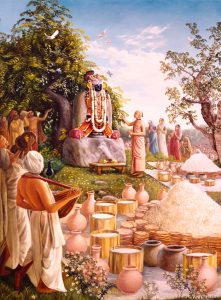 specific prescriptions of the Pañcarātra and other scriptures do not have to be followed. The Bhāgavatam enjoins that even without practising Deity worship one can achieve the complete success of human life by any of the other devotional processes, such as simply offering oneself at the Lord’s feet for His protection. Nonetheless Vaiṣṇavas, following the path of Śrī Nārada and his successors, endeavour to establish a personal relationship with the Lord by receiving the grace of a bona fide spiritual master through initiation, and in this tradition the devotees are obliged at the time of initiation to begin engaging in Deity worship.
specific prescriptions of the Pañcarātra and other scriptures do not have to be followed. The Bhāgavatam enjoins that even without practising Deity worship one can achieve the complete success of human life by any of the other devotional processes, such as simply offering oneself at the Lord’s feet for His protection. Nonetheless Vaiṣṇavas, following the path of Śrī Nārada and his successors, endeavour to establish a personal relationship with the Lord by receiving the grace of a bona fide spiritual master through initiation, and in this tradition the devotees are obliged at the time of initiation to begin engaging in Deity worship.
“Although Deity worship is not essential, the material conditioning of most candidates for devotional service requires that they engage in this activity. When we consider their bodily and mental conditions, we find that the character of such candidates is impure and their minds are agitated. Therefore, to rectify this material conditioning the great sage Nārada and others have at different times recommended various kinds of regulations for Deity worship.” (quoted in Caitanya-caritāmṛta Madhya 15.108 purport)]
Simply by the tongue touching the Kṛṣṇa-mantra, that holy name gives all kinds of perfection, including kṛṣṇa-dāsya and rādhā dāsya. But Śrīla Jīva Gosvāmī has written a very clear commentary to this verse, and you should note this down in your heart for continual remembrance. In his Bhakti-sandarbha (283) he has written:
dvijānām anupetānāṁ svakarmādhyayanādiṣu
yathādhikāro nāstīha syāc copanayanād anu
tathātrādīkṣitānāṁ tu mantra-devārcanādiṣu
nādhikāro ‘sty ataḥ kuryād ātmānaṁ śiva-saṁstutam
[“Even though born in a brāhmaṇa family, one cannot engage in Vedic rituals without being initiated and having a sacred thread. Although born in a brāhmaṇa family, one becomes a brāhmaṇa only after initiation and the sacred thread ceremony. Unless one is initiated as a brāhmaṇa, one cannot worship the holy name properly.” (quoted in Śrī Caitanya-caritāmṛta Madhya 15.108)]*
It is true that simply by touching the tongue kṛṣṇa-nāma can give everything, but the material tongue, the tongue of the conditioned soul cannot touch the transcendental holy name.
ataḥ śrī-kṛṣṇa-nāmādi
na bhaved grāhyam indriyaiḥ
sevonmukhe hi jihvādau
svayam eva sphuraty adaḥ
[“With the material senses one cannot understand the transcendental holy name of the Lord or His form, activities and pastimes. But when one actually engages in devotional service, utilizing the tongue, the Lord is revealed.” Bhakti-rasāmṛta-sindhu 1.2.234)]
Śrī Nārada Muni, and other previous ācāryas like Brahmā, Sanaka, Sananda, Sanātana, and Sanat Kumāra,  have all taken dīkṣā. One receives dīkṣā and then he performs his sādhana bhajana and worships his iṣṭadeva (worshipful deity), Rādhā and Kṛṣṇa. Śrīla Jīva Gosvāmī has written that without dīkṣā there will be no relationship with Kṛṣṇa — neither, dāsya, sakhya, vātsalya nor mādhurya. It will never be possible without dīkṣā. In our sampradāya, sambandha-jñāna comes only by uttering “gopījana-vallabhāya”; otherwise it cannot come.
have all taken dīkṣā. One receives dīkṣā and then he performs his sādhana bhajana and worships his iṣṭadeva (worshipful deity), Rādhā and Kṛṣṇa. Śrīla Jīva Gosvāmī has written that without dīkṣā there will be no relationship with Kṛṣṇa — neither, dāsya, sakhya, vātsalya nor mādhurya. It will never be possible without dīkṣā. In our sampradāya, sambandha-jñāna comes only by uttering “gopījana-vallabhāya”; otherwise it cannot come.
Śrīla Visvanatha Cakravartī Ṭhākura has written an explanation of this same verse, and therein he vividly explains that one may have given up all kinds of sādhana and pious activities. He may be chanting and remembering the holy names of Bhagavan and he may have determined that his Iṣṭadeva is Kṛṣṇa. Still, if he has not taken initiation from a Vaiṣṇava guru, thinking that it is not essential, he can never achieve Kṛṣṇa. The only good result he achieves is that he will not go to hell. He cannot achieve the lotus feet of Kṛṣṇa, in any life, until he is properly initiated. In a future life, by the fruit of his previous activities of bhajana, he will take birth in a very religious family and there he will have sādhu-saṅga, guru pādāśraya, and then dīkṣā. At that time he will make solid advancement in bhakti. This is the only way.
Also, Śrīla Raghunātha dāsa Gosvāmī has written in the first verse of his Śrī Manaḥ-Śikṣā:
gurau goṣṭhe goṣṭhālayiṣu sujane bhūsura-gaṇe
sva-mantre śrī-nāmni vraja-nava-yuva-dvandva-śaraṇe
sadā dambhaṁ hitvā kuru ratim apūrvām atitarām
aye svāntar bhrātaś caṭubhir abhiyāce dhṛta-padaḥ
[“O my dear brother my foolish mind! Taking hold of your feet, I humbly pray to you with sweet words. Please give up all pride and quickly develop sublime and incessant rati for Śrī Gurudeva, Śrī Vraja-dhāma, the residents of Vraja, the Vaiṣṇavas, the brāhmaṇas, my dīkṣā-mantras, the holy names of the Supreme Lord, and the shelter of Kiśora-kiśorī, Śrī Śrī Rādhā-Kṛṣṇa, the eternally youthful divine couple of Vraja.”]
Why has he said “mantra” if dīkṣā initiation is not necessary? Why he has not said only “Śrī nāmni”? What is sva-mantra? There is some difference between mantra and harināma, and that is why he has told his mind, “You should develop sublime and unprecedented attachment for both. Take shelter of nāma and mantra, and then your life will be successful.” So there are two things – not one. Śrīla Raghunātha has written, “sadā dambhaṁ hitvā kuru ratim apūrvām atitarām – O mind, you should give up your false pride and try to develop sublime and unprecedented attachment for both.” His guru gave him mantra, and that is dīkṣā.
We should now reconcile all these things.
*[The quote of Śrīla Prabhupāda speaking in Paris in 1973, as quoted by Śrīpād Padmanābha Mahārāja at the beginning of this lecture, refers to this verse of Śrīla Jīva Gosvāmī.]

The following is an excerpt from Going Beyond Vaikuṇṭha, Chapter 3, 4th edition by Śrīla Bhaktivedānta Nārāyaṇa Mahārāja
Suppose we are cutting grass, and someone says to us, “Please use a golden blade to cut the grass.” Will we  use a golden blade to cut the grass? No, an iron blade will be more effective. Similarly, because we are in such a conditioned state, chanting the gopāla-mantra and kāma-gāyatrī is also necessary. At different stages, different things are necessary, but we shall understand nāma-saṅkīrtana to be the best thing in sādhana, and in perfection. The gopāla-mantra is effective only in sādhana, but not in the stage of perfection. The perfected soul will not chant it, because its work has been completed. We must understand this point well: nāma-saṅkīrtana is necessary in the conditioned state, but along with it we must chant the gopāla-mantra, the mantra of Mahāprabhu (gaura-gāyatrī), and all other mantras that our spiritual master has given us. The efficacy of these mantras is that they make sambandha-jñāna arise and the attachment to sense enjoyment fade away. Anyone who follows this method sincerely for one year, or even six months, will certainly see what its result is. If the desired result doesn’t come, then there must be some problem. Perhaps the seed, the mantra, was not very potent because the giver was not pure, or perhaps we are not chanting from the heart or we are cheating in some way. Rather, giving it our heart, with deep faith and firm determination we should chant.
use a golden blade to cut the grass? No, an iron blade will be more effective. Similarly, because we are in such a conditioned state, chanting the gopāla-mantra and kāma-gāyatrī is also necessary. At different stages, different things are necessary, but we shall understand nāma-saṅkīrtana to be the best thing in sādhana, and in perfection. The gopāla-mantra is effective only in sādhana, but not in the stage of perfection. The perfected soul will not chant it, because its work has been completed. We must understand this point well: nāma-saṅkīrtana is necessary in the conditioned state, but along with it we must chant the gopāla-mantra, the mantra of Mahāprabhu (gaura-gāyatrī), and all other mantras that our spiritual master has given us. The efficacy of these mantras is that they make sambandha-jñāna arise and the attachment to sense enjoyment fade away. Anyone who follows this method sincerely for one year, or even six months, will certainly see what its result is. If the desired result doesn’t come, then there must be some problem. Perhaps the seed, the mantra, was not very potent because the giver was not pure, or perhaps we are not chanting from the heart or we are cheating in some way. Rather, giving it our heart, with deep faith and firm determination we should chant.

The following is an excerpt from a Hindi Darśana with Śrīla Bhaktivedānta Nārāyaṇa Mahārāja in Houston, Texas, on May 31, 2010, published in Walking with a Saint – Morning Walks and Conversations 2010
Viṣṇu dāsa: You said that if one chants the holy name, it has an effect even without understanding the meaning. So, if one chants the gāyatrī-mantras without understanding the meaning, will that also have an effect?
Śrīla Bhaktivedānta Nārāyaṇa Mahārāja: One should understand the meaning of the gāyatrī-mantras from the spiritual master; that is, he must understand the five limbs that are associated with the mantras. Only then will it have the full effect.
Viṣṇu dāsa: If the person who gives the gāyatrī-mantras has not realized those mantras, will that have any effect?
Śrīla Bhaktivedānta Nārāyaṇa Mahārāja: No, the mantras have effect only if you receive them from someone who has realized them.

The following is an excerpt from Śrīla Bhaktivedānta Nārāyaṇa Mahārāja’s commentary on Bhajana-rahasya, Chapter 1, Text 33
While chanting the holy name, the sādhaka should remember Rādhā-Kṛṣṇa’s pastimes of meeting (milana) and 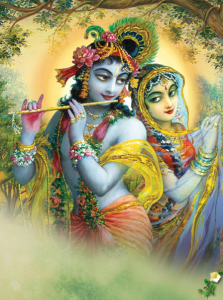 separation (vipralambha). When he chants his mantras, he should practice in the following five ways: (1) The sādhaka should know the meaning of the mantra, and remember the predominating Deity of the mantra (the mantra-devatā) and his own specific relationship with that Deity. (2) Nyāsa – “The Deity of the mantra is my protector” – this conviction is called nyāsa. It is true that success can be attained by uttering the mantra one time only; nonetheless, the mantra is uttered 10 or 108 times for the pleasure of the mantra-devatā. This is also called nyāsa. (3) Prapatti – “I take shelter of the lotus feet of the mantra-devatā” – this is called prapatti. (4) Śaraṇāgati – “I am a jīva who is suffering extremely, and therefore I surrender to the Deity [in six ways]” – this resolve is śaraṇāgati. (5) Ātma-nivedana – “Whatever I have belongs to Him; it is not mine. I am not mine either; I am His for Him to enjoy.” This is ātma-nivedana. If one follows the process comprised of these five limbs, he will quickly attain perfection in chanting his mantras.
separation (vipralambha). When he chants his mantras, he should practice in the following five ways: (1) The sādhaka should know the meaning of the mantra, and remember the predominating Deity of the mantra (the mantra-devatā) and his own specific relationship with that Deity. (2) Nyāsa – “The Deity of the mantra is my protector” – this conviction is called nyāsa. It is true that success can be attained by uttering the mantra one time only; nonetheless, the mantra is uttered 10 or 108 times for the pleasure of the mantra-devatā. This is also called nyāsa. (3) Prapatti – “I take shelter of the lotus feet of the mantra-devatā” – this is called prapatti. (4) Śaraṇāgati – “I am a jīva who is suffering extremely, and therefore I surrender to the Deity [in six ways]” – this resolve is śaraṇāgati. (5) Ātma-nivedana – “Whatever I have belongs to Him; it is not mine. I am not mine either; I am His for Him to enjoy.” This is ātma-nivedana. If one follows the process comprised of these five limbs, he will quickly attain perfection in chanting his mantras.
Image/Art made possible by Pixabay.com & Krishnapath.org








